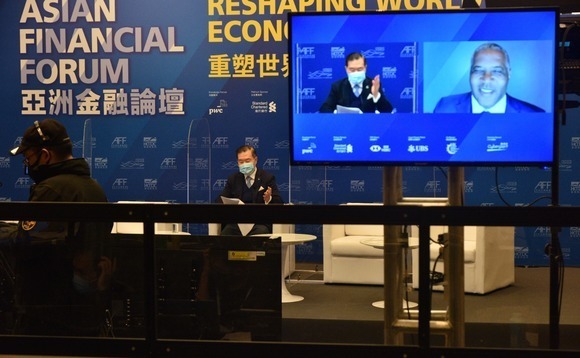
Vista founder calls for investment in Asia tech infrastructure

Vista Equity Partners is keen to invest in Asia’s financial technology space, but founder Robert F. Smith stressed that governments must put in place the appropriate regulatory infrastructure.
"COVID-19 has accelerated the opportunity for people to manage risk, to think about risk, and motivated companies to participate. The government has to make sure they are moving along at the pace consumers would like and that the technology can actually deliver," Smith told the Asian Financial Forum. "That should attract sophisticated capital like ourselves, it should attract sophisticated talent – and that is going to drive the opportunity."
Vista is the largest private equity firm globally dedicated to investment in enterprise software, with more than $73 billion in assets under management. Fintech, and insurance technology specifically, is one of its largest segments. Smith noted that insurtech investment remained robust despite COVID-19 as insurance companies recognized the need to accelerate virtual interaction with customers, principally in the areas of sales and claims.
"Years ago, a lot of investments were done to reduce expenses and back-office operations, but that has changed," he said. "Now they are looking to accelerate investment in sales, claims, and bringing out superior products and services to capture more market share."
However, many insurance companies lack the talent to push through this kind of transformation, so they need partners. Vista and its portfolio companies benefit from this dynamic, but there is also the broader issue of how to support large-scale deployment of fintech – in a way that facilitates seamless interaction not only between the consumer and enterprise worlds but also between countries. Global ecosystem development relies on governments as well as companies.
Asia has unique appeal as a target market, with China, India and the ASEAN member nations accounting for 40% of the global population, including fast-rising middle classes. They will want more in terms of insurance and products and services as they accumulate more wealth. At the same time, computing capacity and connectivity in these markets are growing exponentially, which creates increasing opportunities for tech enablement.
"By the force of those factors there should be a massive expansion of delivering digital infrastructure and applications, in insurtech in particular," said Smith. "I look at some of the larger companies that have done it extremely well. Ping An has morphed into a technology company. They are building connected platforms in insurance, health, property, automotive, and services, with more than 700 million users on certain platforms."
Other companies will be encouraged to do the same, but scale can only be achieved with a supporting B2B infrastructure. The Greater Bay Area, and Hong Kong specifically, can help bridge Asia with the rest of the world, Smith observed. He pointed to Hong Kong's legal and regulatory frameworks – historically trusted by the international community – as well as its potential to develop talent and create conditions conducive to innovation.
"It's important to ensure you have non-Asian investors participating in that fabric who have experience, who have platforms, who have assets they have invested in that are global assets so there can be an acceleration of the opportunity set," he added. "This can de-risk the investment for everyone involved."
The threat to interoperability that underpins global fintech expansion is a divergence in technology standards. A decoupling of the Chinese and US ecosystems – currently reflected in China's desire to become less reliant on imports in core infrastructure areas and in America's willingness to punish Chinese companies for alleged infractions – could essentially deliver this outcome.
"I worry that a further bifurcation would damage that interoperability. Hong Kong and the Greater Bay Area can in some respects play a pivotal role in demonstrating the importance of maintaining relationships, and technical relationships and partnerships, so that we all benefit from an expanding opportunity rather than a limited one created by bifurcated tech stacks," Smith said.
In a separate session, Stephen Schwarzman, chairman, CEO and co-founder of The Blackstone Group, said he expected the Biden administration to pursue a softer tone in relations with China and look for ways to work together. While the two countries have their differences, interests overlap in multiple areas, from climate change to healthcare to counterterrorism.
"To not have these two countries working in a cooperative fashion seems exceptionally odd and unproductive for the citizens of both countries," Schwarzman said, adding that it is "hard to imagine" tensions escalating from the current level.
Latest News
Asian GPs slow implementation of ESG policies - survey
Asia-based private equity firms are assigning more dedicated resources to environment, social, and governance (ESG) programmes, but policy changes have slowed in the past 12 months, in part due to concerns raised internally and by LPs, according to a...
Singapore fintech start-up LXA gets $10m seed round
New Enterprise Associates (NEA) has led a USD 10m seed round for Singapore’s LXA, a financial technology start-up launched by a former Asia senior executive at The Blackstone Group.
India's InCred announces $60m round, claims unicorn status
Indian non-bank lender InCred Financial Services said it has received INR 5bn (USD 60m) at a valuation of at least USD 1bn from unnamed investors including “a global private equity fund.”
Insight leads $50m round for Australia's Roller
Insight Partners has led a USD 50m round for Australia’s Roller, a venue management software provider specializing in family fun parks.








